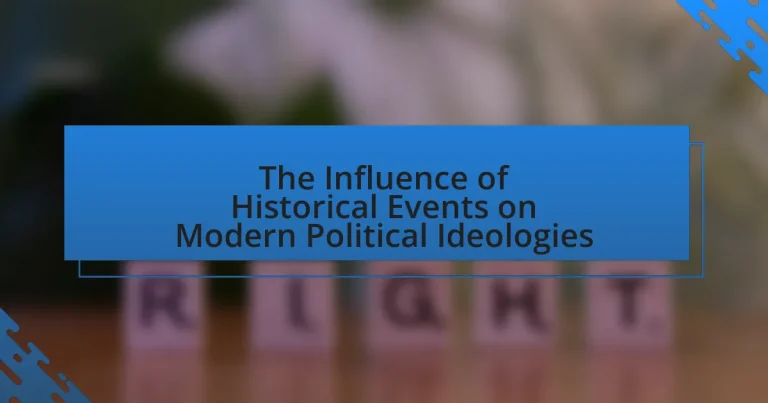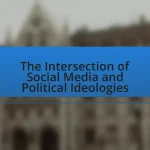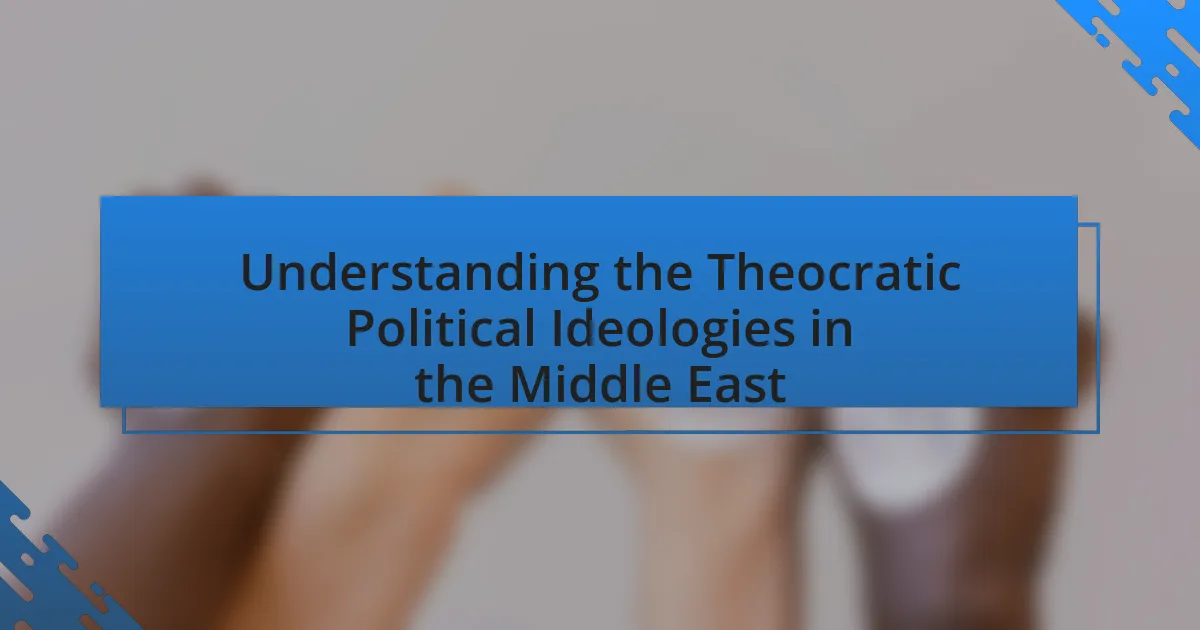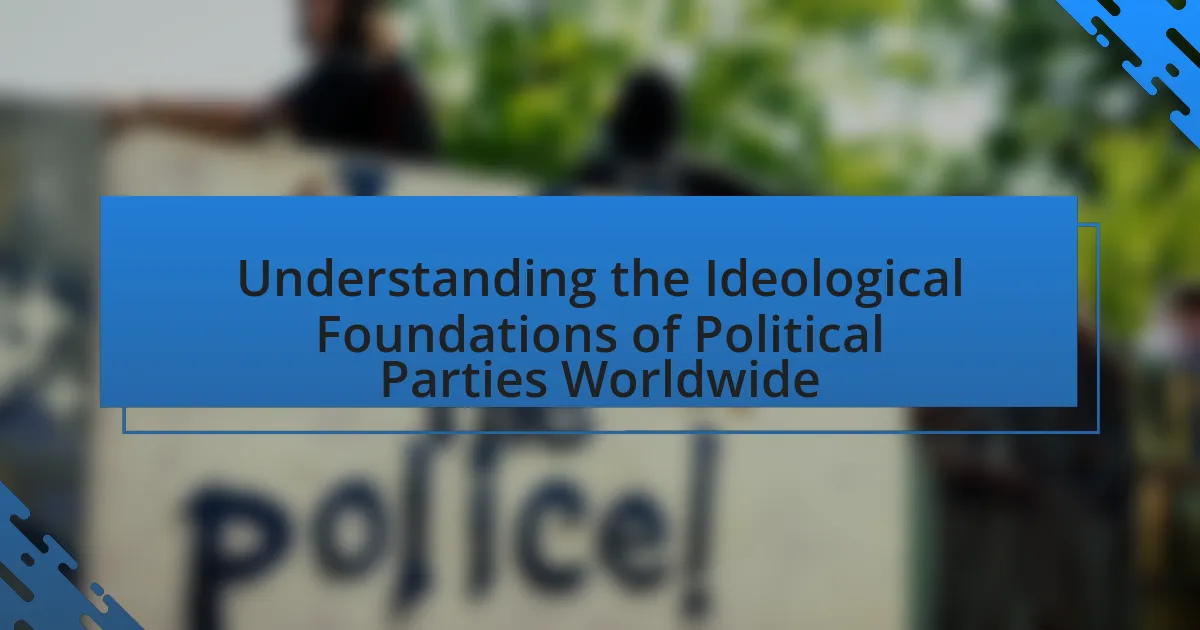The article examines the influence of historical events on modern political ideologies, highlighting how significant occurrences such as the Enlightenment, the American and French Revolutions, and the World Wars have shaped contemporary political thought. It discusses the mechanisms through which these events create ideological shifts, emphasizing the role of crises and societal changes in redefining governance concepts. Key historical milestones are analyzed for their impact on ideologies like liberalism, socialism, and nationalism, illustrating the direct correlation between past events and current political frameworks. The article also explores the implications of understanding these influences for contemporary political discourse and future developments.
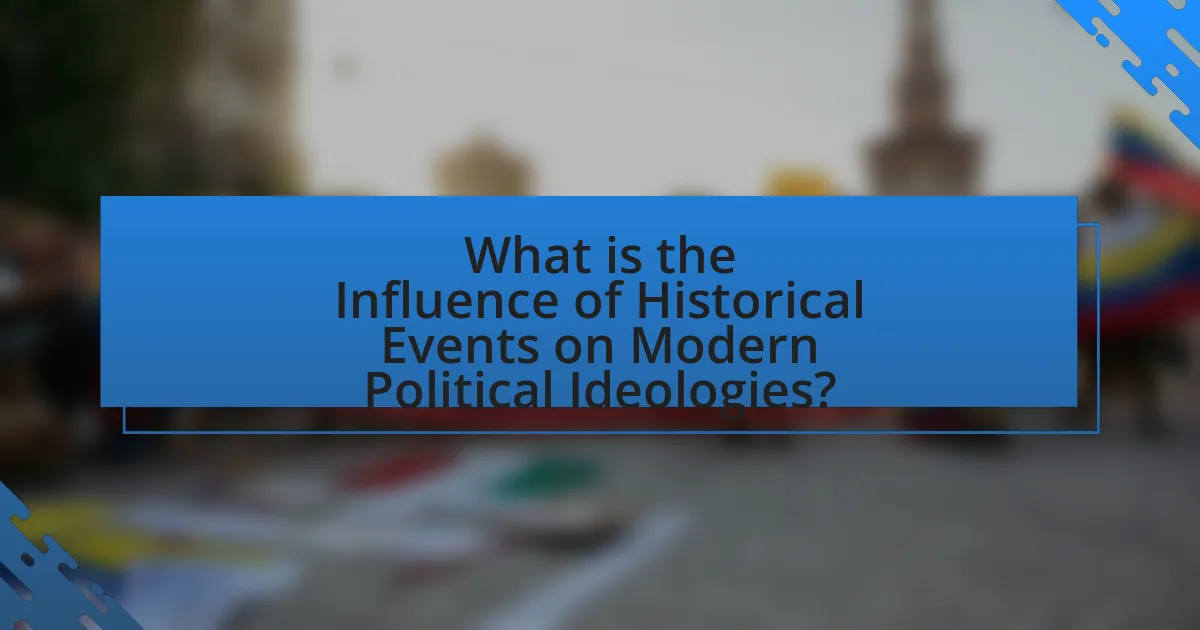
What is the Influence of Historical Events on Modern Political Ideologies?
Historical events significantly shape modern political ideologies by providing context, lessons, and frameworks that influence contemporary thought. For instance, the Enlightenment period, marked by the rise of reason and individualism, laid the groundwork for liberal ideologies emphasizing personal freedoms and democratic governance. The aftermath of World War II led to the establishment of social democracy in many Western nations, promoting welfare states and collective responsibility as responses to the economic devastation and social upheaval of the war. Additionally, the Cold War era fostered the development of various political ideologies, such as communism and neoliberalism, as nations reacted to the ideological battle between capitalism and socialism. These historical contexts illustrate how past events inform current political beliefs and practices, demonstrating a direct lineage from historical occurrences to modern ideological frameworks.
How do historical events shape political ideologies?
Historical events shape political ideologies by providing context and impetus for change in societal beliefs and governance structures. For instance, the French Revolution (1789) catalyzed the rise of liberalism by challenging monarchic authority and promoting ideas of individual rights and democracy. Similarly, the aftermath of World War II led to the establishment of social democracy in many Western nations, as governments sought to address economic inequalities and promote welfare systems in response to the devastation and social unrest caused by the war. These events illustrate how significant historical moments can redefine political thought, influencing the ideologies that emerge in their wake.
What are the key historical events that have influenced modern political thought?
Key historical events that have influenced modern political thought include the Enlightenment, the American Revolution, the French Revolution, and the Industrial Revolution. The Enlightenment, occurring in the 17th and 18th centuries, emphasized reason, individualism, and skepticism of authority, laying the groundwork for democratic ideals. The American Revolution (1775-1783) established principles of liberty and self-governance, inspiring subsequent movements for independence and democracy worldwide. The French Revolution (1789-1799) further advanced concepts of equality and citizenship, challenging monarchies and promoting republicanism. The Industrial Revolution (18th-19th centuries) transformed economies and societies, leading to new political ideologies such as socialism and capitalism, which addressed the rights of workers and the role of government in economic life. Each of these events significantly shaped contemporary political ideologies and frameworks.
How do these events create ideological shifts?
Historical events create ideological shifts by altering societal perceptions and values, often in response to crises or significant changes. For instance, the Industrial Revolution transformed economic structures and class relations, leading to the rise of socialism as a response to worker exploitation. Similarly, the Civil Rights Movement in the United States shifted public ideology towards greater equality and justice, influencing policies and social norms. These events serve as catalysts, prompting individuals and groups to reevaluate their beliefs and align with new ideologies that address emerging social realities.
Why is understanding this influence important?
Understanding the influence of historical events on modern political ideologies is important because it provides context for current political beliefs and behaviors. Historical events shape the foundational principles and values of political systems, influencing how societies respond to contemporary issues. For instance, the aftermath of World War II led to the establishment of various political ideologies, such as socialism and liberalism, which continue to affect global politics today. Recognizing these connections allows individuals and policymakers to better navigate political landscapes and address societal challenges effectively.
How does this understanding affect contemporary political discourse?
Understanding the influence of historical events on modern political ideologies significantly shapes contemporary political discourse by providing context for current beliefs and practices. This context allows political actors to frame their arguments and policies in relation to past events, such as revolutions, wars, and social movements, which have historically defined ideological boundaries. For instance, the legacy of the civil rights movement informs ongoing discussions about racial equality and justice, influencing both public opinion and legislative agendas. Additionally, historical events serve as reference points that political leaders use to rally support or critique opposing views, thereby impacting the effectiveness of their communication strategies. This interplay between history and ideology is evident in the way political parties align themselves with historical narratives to legitimize their platforms, demonstrating that an understanding of historical context is crucial for engaging in meaningful political dialogue today.
What implications does it have for future political developments?
Historical events significantly shape modern political ideologies, which in turn influence future political developments. For instance, the aftermath of World War II led to the establishment of international institutions like the United Nations, promoting global cooperation and influencing democratic governance worldwide. This historical context has fostered a trend towards multilateralism and collective security, suggesting that future political developments will likely prioritize international collaboration over unilateral actions. Additionally, the rise of populism in response to economic crises, as seen in various countries since the 2008 financial collapse, indicates that future political landscapes may increasingly reflect the tensions between established political elites and grassroots movements. Thus, understanding these historical influences is crucial for anticipating shifts in political dynamics and ideologies.
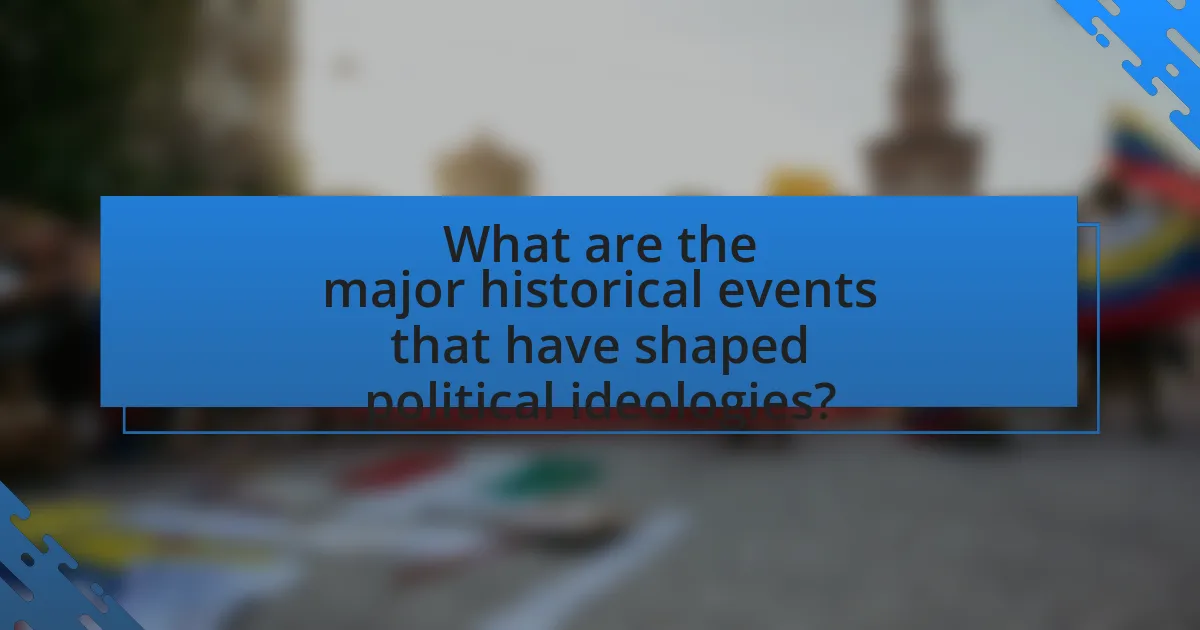
What are the major historical events that have shaped political ideologies?
Major historical events that have shaped political ideologies include the Enlightenment, the American Revolution, the French Revolution, the Industrial Revolution, and the World Wars. The Enlightenment introduced ideas of individual rights and rational governance, influencing liberalism. The American Revolution established principles of democracy and self-governance, which inspired democratic movements globally. The French Revolution emphasized equality and fraternity, leading to the rise of socialism and nationalism. The Industrial Revolution transformed economies and societies, giving rise to capitalism and labor movements. The World Wars challenged existing political structures and ideologies, leading to the emergence of totalitarian regimes and the Cold War’s ideological divide between capitalism and communism. Each of these events significantly contributed to the development and evolution of modern political ideologies.
How did the Enlightenment influence modern political ideologies?
The Enlightenment significantly influenced modern political ideologies by promoting principles such as individual rights, reason, and the separation of powers. Thinkers like John Locke argued for natural rights, which laid the groundwork for liberalism, emphasizing personal freedom and government accountability. Additionally, Montesquieu’s advocacy for the separation of powers directly informed the structure of modern democratic governments, ensuring checks and balances. The Enlightenment’s emphasis on rational thought and skepticism of authority also inspired movements for social justice and equality, shaping contemporary ideologies like socialism and feminism. These foundational ideas continue to underpin political discourse and governance today.
What key thinkers emerged during the Enlightenment?
Key thinkers who emerged during the Enlightenment include John Locke, Voltaire, Jean-Jacques Rousseau, and Immanuel Kant. John Locke’s theories on government and natural rights significantly influenced liberal political thought, advocating for the idea that government derives its authority from the consent of the governed. Voltaire championed civil liberties and freedom of speech, critiquing established religion and advocating for tolerance. Jean-Jacques Rousseau introduced the concept of the social contract, emphasizing the importance of collective will and democracy. Immanuel Kant’s work on reason and autonomy laid the groundwork for modern philosophy and ethics. These thinkers collectively shaped modern political ideologies by promoting reason, individual rights, and democratic governance.
How did their ideas challenge existing political structures?
Their ideas challenged existing political structures by advocating for principles such as democracy, individual rights, and social equality, which directly opposed authoritarian regimes and monarchies. For instance, Enlightenment thinkers like John Locke and Jean-Jacques Rousseau promoted the concept of the social contract, arguing that government legitimacy derives from the consent of the governed, thereby undermining the divine right of kings. This ideological shift contributed to revolutionary movements, such as the American Revolution in 1776 and the French Revolution in 1789, which sought to dismantle oppressive systems and establish governments based on popular sovereignty and civil liberties.
What role did revolutions play in shaping political ideologies?
Revolutions played a crucial role in shaping political ideologies by challenging existing power structures and promoting new ideas about governance and society. For instance, the American Revolution (1775-1783) introduced concepts of democracy and individual rights, influencing liberal ideologies. Similarly, the French Revolution (1789-1799) propagated ideas of equality, fraternity, and secularism, which laid the groundwork for modern socialist and republican thought. These revolutions not only inspired subsequent movements worldwide but also led to the establishment of political frameworks that emphasized citizenship, rights, and the role of the state, fundamentally altering the landscape of political ideologies.
Which revolutions had the most significant impact?
The revolutions that had the most significant impact include the American Revolution, the French Revolution, and the Russian Revolution. The American Revolution (1775-1783) established the principles of democracy and individual rights, influencing numerous independence movements worldwide. The French Revolution (1789-1799) introduced concepts of liberty, equality, and fraternity, reshaping political ideologies and inspiring future revolutions across Europe and Latin America. The Russian Revolution (1917) led to the rise of communism, fundamentally altering global political dynamics and inspiring socialist movements globally. Each of these revolutions not only transformed their respective nations but also had lasting effects on political thought and governance worldwide.
How did these revolutions redefine concepts of governance?
Revolutions such as the American, French, and Russian revolutions fundamentally redefined concepts of governance by promoting ideas of democracy, individual rights, and the sovereignty of the people. The American Revolution established the principle of representative government, leading to the creation of a constitution that emphasized checks and balances, while the French Revolution introduced the notion of popular sovereignty and the idea that government should reflect the will of the people. The Russian Revolution further challenged traditional autocratic rule by advocating for a socialist state that aimed to eliminate class distinctions and promote collective ownership. These shifts in governance concepts were significant as they laid the groundwork for modern democratic systems and influenced political ideologies worldwide, demonstrating the power of collective action and the demand for accountability in governance.
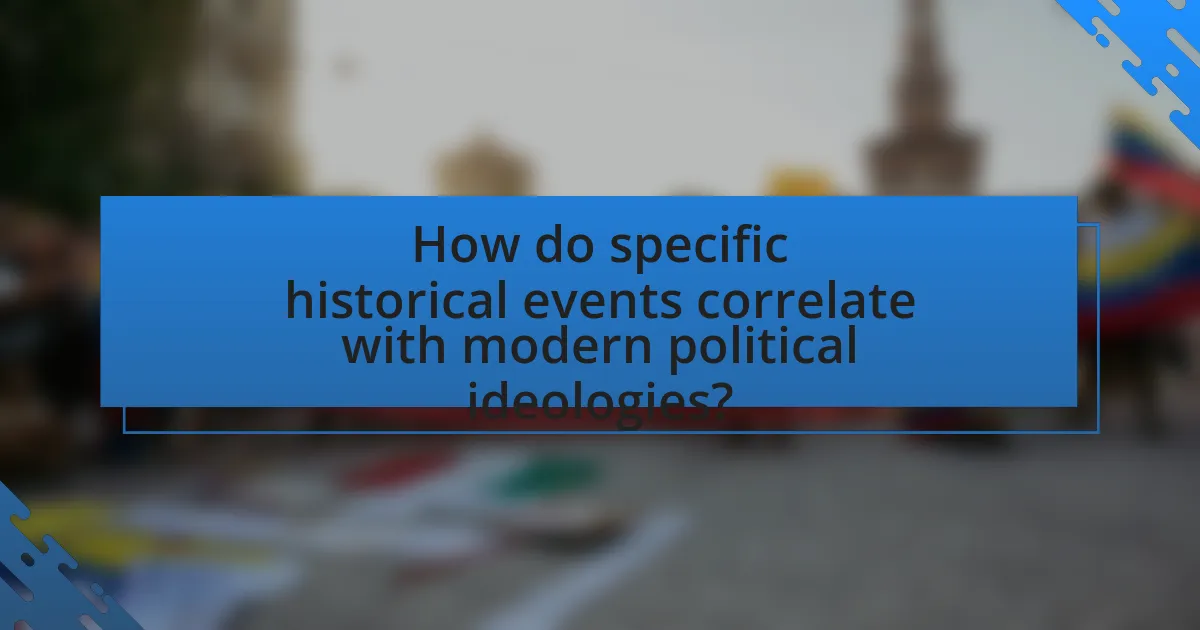
How do specific historical events correlate with modern political ideologies?
Specific historical events significantly shape modern political ideologies by providing foundational contexts and frameworks for contemporary beliefs. For instance, the Enlightenment period, characterized by the promotion of reason and individual rights, directly influenced liberal ideologies that prioritize personal freedoms and democratic governance. The French Revolution, which emphasized equality and fraternity, laid the groundwork for socialist movements advocating for social justice and economic equity. Additionally, the aftermath of World War II and the establishment of the United Nations fostered a global emphasis on human rights, which is now a core tenet of many political ideologies worldwide. These historical milestones illustrate how past events inform and evolve current political thought, demonstrating a clear correlation between history and ideology.
What is the connection between World War II and contemporary political ideologies?
World War II significantly shaped contemporary political ideologies by establishing the foundations for modern liberal democracy, socialism, and nationalism. The aftermath of the war led to the emergence of the United Nations and the promotion of human rights, influencing liberal democratic values globally. Additionally, the conflict catalyzed the rise of socialist movements, particularly in Europe, as nations sought to rebuild economies and address inequalities exposed by the war. The ideological battle between capitalism and communism during the Cold War further solidified these political frameworks, as countries aligned themselves with either the Western bloc or the Eastern bloc. Historical events from World War II, such as the Holocaust and the fight against fascism, also reinforced the importance of anti-totalitarianism in contemporary political discourse, shaping ideologies that prioritize individual freedoms and democratic governance.
How did the aftermath of World War II influence global political structures?
The aftermath of World War II significantly reshaped global political structures by leading to the establishment of the United Nations and the emergence of the Cold War. The United Nations, founded in 1945, aimed to promote international cooperation and prevent future conflicts, fundamentally altering diplomatic relations and creating a platform for multilateral dialogue. Additionally, the geopolitical landscape was divided into two dominant spheres of influence: the Western bloc led by the United States, promoting capitalism and democracy, and the Eastern bloc led by the Soviet Union, advocating for communism. This division not only influenced military alliances, such as NATO and the Warsaw Pact, but also spurred decolonization movements across Asia and Africa, as former colonies sought self-determination in the context of the new global order. The ideological battle between capitalism and communism during the Cold War further entrenched political ideologies worldwide, shaping governance and policy decisions in numerous countries.
What ideologies emerged as a response to the war?
The ideologies that emerged as a response to the war include fascism, communism, and liberalism. Fascism arose in the aftermath of World War I, characterized by authoritarian nationalism and a rejection of democratic governance, as seen in Mussolini’s Italy. Communism gained traction following the Russian Revolution of 1917, advocating for a classless society and the abolition of private property, which was a direct response to the economic turmoil and social inequalities exacerbated by the war. Liberalism, while existing prior to the war, evolved to emphasize individual rights and democratic governance as a counter to the totalitarian regimes that emerged in its wake. These ideologies were shaped by the socio-political landscape created by the war, reflecting the desire for new governance models in response to the failures of existing systems.
How did the Cold War shape political ideologies in the modern era?
The Cold War significantly shaped political ideologies in the modern era by establishing a global dichotomy between capitalism and communism. This ideological conflict influenced numerous countries’ political structures, leading to the adoption of either capitalist or socialist policies based on alignment with the United States or the Soviet Union. For instance, the spread of communism in Eastern Europe and parts of Asia resulted in the establishment of one-party states, while Western nations embraced democratic capitalism, promoting individual freedoms and market economies. The ideological battle also led to the proliferation of proxy wars and the formation of military alliances, such as NATO and the Warsaw Pact, which further entrenched these political ideologies globally. The legacy of the Cold War continues to manifest in contemporary political discourse, where debates over socialism versus capitalism remain prevalent, illustrating the enduring impact of this historical conflict on modern political thought.
What were the ideological battles during the Cold War?
The ideological battles during the Cold War primarily revolved around the conflict between capitalism, represented by the United States and its allies, and communism, led by the Soviet Union. This ideological divide manifested in various forms, including political, economic, and military tensions, as both superpowers sought to expand their influence globally. For instance, the U.S. promoted democratic governance and free-market economies, while the Soviet Union advocated for a one-party state and state-controlled economies. Key events such as the Korean War, the Cuban Missile Crisis, and the Vietnam War exemplified these ideological confrontations, as each side attempted to assert its worldview and counter the other’s expansionist policies. The ideological struggle significantly shaped international relations and influenced political ideologies in numerous countries during this period.
How do these ideological divisions persist today?
Ideological divisions persist today through entrenched political identities and social polarization. These divisions are reinforced by historical events, such as the Cold War, which solidified opposing views on governance and economic systems, leading to lasting partisan divides. For instance, contemporary debates on issues like healthcare and climate change often reflect the ideological battles rooted in past conflicts, with political parties aligning closely with historical narratives that resonate with their base. Additionally, social media amplifies these divisions by creating echo chambers, where individuals are exposed primarily to viewpoints that align with their own, further entrenching ideological divides.
What lessons can we learn from the influence of historical events on political ideologies?
Historical events significantly shape political ideologies by illustrating how societal needs and responses to crises can lead to ideological shifts. For instance, the aftermath of World War II saw the rise of social democracy in Europe, as nations sought to address economic instability and social inequality through welfare policies. This shift was influenced by the need for reconstruction and the desire to prevent the rise of totalitarian regimes, demonstrating that historical context can drive ideological evolution. Additionally, the civil rights movement in the United States highlighted how social movements can reshape political ideologies, leading to greater emphasis on equality and justice within liberal frameworks. These examples underscore that political ideologies are not static; they adapt in response to historical challenges and societal demands, reflecting the dynamic interplay between events and ideological development.
How can understanding these influences guide current political strategies?
Understanding the influences of historical events on modern political ideologies can guide current political strategies by providing insights into voter behavior and ideological shifts. For instance, analyzing the impact of the Civil Rights Movement on contemporary social justice policies reveals how historical struggles shape current political discourse and alignments. This understanding allows political strategists to tailor their messaging and policy proposals to resonate with the values and experiences of constituents, thereby enhancing electoral success. Historical data, such as voting patterns and demographic changes post-World War II, further illustrates how past events inform present political landscapes, enabling parties to anticipate and respond to emerging trends effectively.
What best practices can be derived from historical analysis of political ideologies?
Best practices derived from historical analysis of political ideologies include the importance of contextual understanding, the evaluation of ideological evolution, and the recognition of the impact of socio-economic factors. Contextual understanding emphasizes that political ideologies cannot be fully grasped without considering the historical events that shaped them, such as revolutions or wars, which influenced the development of ideologies like liberalism and socialism. Evaluating ideological evolution reveals how political beliefs adapt over time in response to changing societal needs, as seen in the transition from classical liberalism to modern welfare state policies. Recognizing socio-economic factors highlights that ideologies often emerge from specific economic conditions, such as the rise of Marxism during the Industrial Revolution, which was a response to capitalist exploitation. These practices underscore the necessity of a comprehensive approach to analyzing political ideologies, ensuring that contemporary applications are informed by historical lessons.
